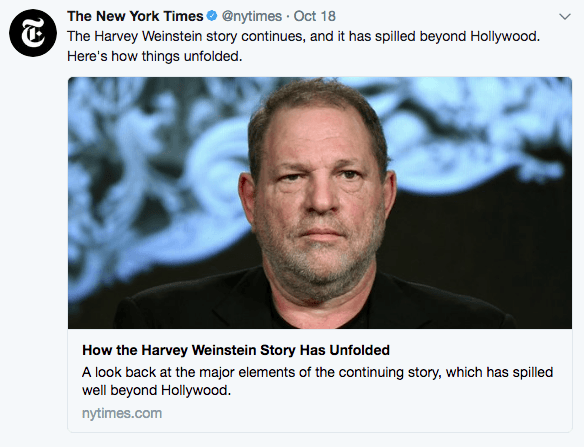By Sierra Goodman
It’s no secret that the landscape of crisis communications has changed significantly due to the prevalence of social media. According to the Pew Research Center, 67 percent of U.S. adults received news from social media this year and of those users, 74 percent get their information from Twitter. Increasingly, we have seen social media used as a tool for social change. Crises involving public figures and brands have the added input of social media which can act as fuel to a burning fire. Here are some examples of how social media has brought social issues to the forefront of conversation:
Harvey Weinstein and #MeToo
It was recently brought to light that Harvey Weinstein has a reputation for sexual assault within the Hollywood community. This has been going on for decades but was unknown to the general public until now. After The New York Times published an article about Weinstein paying off his sexual assault accusers, social media made his actions finally surface. The stories have started a conversation on social media with the trending #MeToo, creating a platform for sexual assault survivors and supporters to speak up. This has brought up many other cases of sexual assault, both inside and outside of the film industry. As a result, Weinstein was terminated by The Weinstein Company and kicked out of the Film Academy. Without social media, the New York Times article uncovering this story would not have reached as many audiences as it did.

Starbucks and #borderfreecoffee
In August 2017, the hashtag #borderfreecoffee was trending on Twitter and suggested that undocumented immigrants would receive 40 percent off Starbucks coffee for “Dreamer Day.” At first, Twitter buzzed with praise for Starbucks until it was revealed that this information originated from an online message board in hopes of luring undocumented immigrants to Starbucks and reporting them to U.S. Immigration and Customs Enforcement. Starbucks took to Twitter to confirm the information was a hoax. While social media has the ability to spread information widely for social change, it can also be used to spread false information.

Racist Dove Ad
The soap brand, Dove, recently came out with an advertisement that featured an African American woman taking off her shirt to reveal a white woman. Social media pointed out the ad as racist because it implied that darker skin is “dirty” and lighter skin is “clean.” Social media did not fail to remind both the brand and public why the ad was wrong and that it was not the first time Dove was racially insensitive. Dove released a statement to apologize for the offensive message. Social media has allowed for consumers to have a voice and as a result, companies are expected to take action and apologize when they miss the mark.
 .
.

Social media can be both a gift and a curse for PR professionals and it is crucial for brands to know how to use it and how it is used by the public. If you’re interested in learning more about crisis communication, check out the links below.



